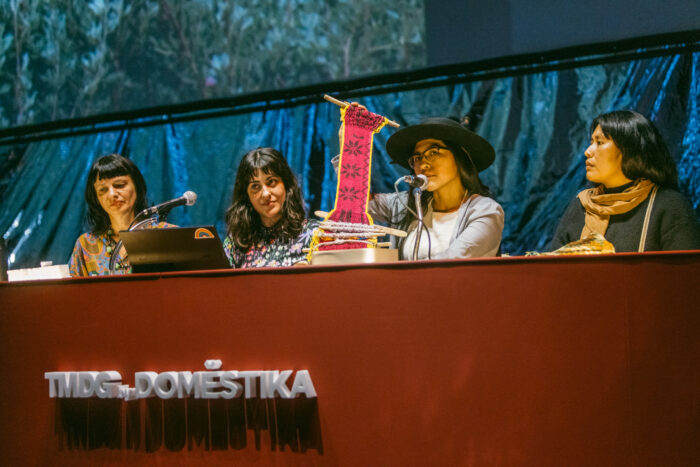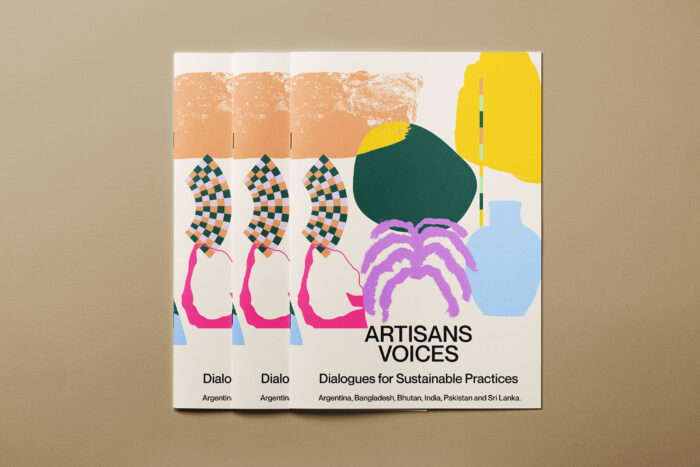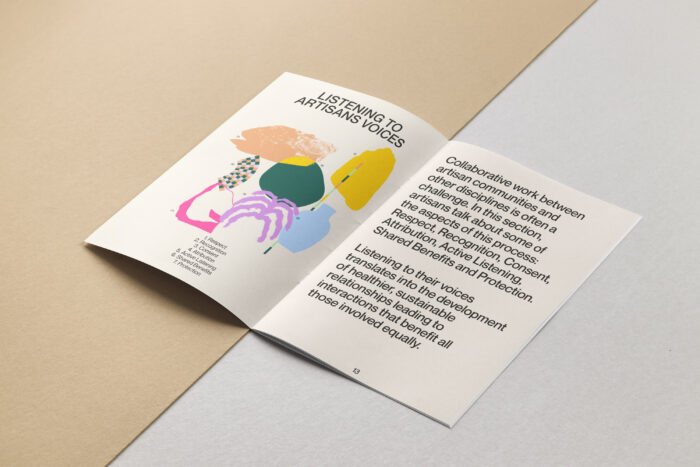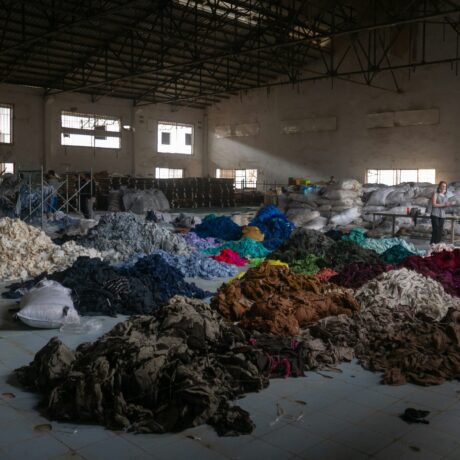Artisan Voices: Dialogues for Sustainable Practices
Last month, Artisan Voices: Dialogues for sustainable practices was presented at the TRImarchi design festival for an audience of more than 6,000 people. This book is part of Crafting Futures – the British Council global programme – and was developed by REDIT – Red Federal Interuniversitaria de Diseño de Indumentaria y Textil (Argentina), Craft Revival Trust (India) and the British Council.
The conversation brought together the protagonists of “Artisan Voices” along with Fashion Revolution to reflect on the good practices necessary in the ecosystem of collaborative work between craft and design. Participants included Carry Somers, co-founder of Fashion Revolution, Argentine artisans Celeste Valero (Andean Weavers) and Anabel del Valle Luna (Thañí/Viene del monte), Sol Marinucci (Crafting Futures Argentina), audiovisual producer Hernán Kacew and designer Sofía Noceti.
Fashion Revolution, which shares the quest for transparency in the world of fashion, design and craft, added its communication platforms as strategic support to this initiative. Within the framework of Fashion Revolution Week 2022, a virtual meeting was held, organized by Crafting Futures, the British Council, REDIT and the Craft Revival Trust, which can be seen here. The participants were Carry Somers, co-founder of Fashion Revolution, Argentine artisans Celeste Valero (Andean Weavers) and Claudia Aybar (Randeras de El Cercado), Sol Marinucci (Crafting Futures Argentina), Ritu Sethi (Craft Revival Trust) and Alejandra Mizrahi ( REDIT).

Snippets from the conversation at TRImarchi
Sol Marinucci, coordinator of Crafting Futures en Argentina.
“Recognizing the master craftswomen as sources of living wisdom, we want to raise awareness about how important it is to create spaces to explore possible sustainable futures. This publication seeks to amplify the voices of craftsmen and craftswomen, which is why we decided that the concepts addressed should be enunciated by those who carry out the praxis, beyond the etymological meaning or the definitions of the academy. I want to share a phrase from one of the participating artisans, Margarita Ramírez, from the Tinku Kamayu cooperative (Santa María, Catamarca). Her words sum up very well the bridge that this book sought to be: ‘I felt that we are not alone and that the knowledgeable people – as I call them – from schools and universities took us into account. I felt that justice was done because we, who do not study, are also part of that world since we have the knowledge in our souls. I feel like a big stone was set in motion and that it has already started to roll.’
It is very common for knowledge to be associated with theoretical knowledge, but there is other knowledge that comes from the practice of doing and experience; That’s what we wanted to highlight. Six countries participated in the publication (Argentina, Bangladesh, Bhutan, India, Pakistan and Sri Lanka) and, in all of them, the artisans’ request for fair treatment is repeated. We would love for this to become a movement full of commitment and concrete actions that lead us to ethical, sustainable and beneficial relationships.”
Anabel del Valle Luna
Member of Thañí/Viene del monte, a group of indigenous women from the Wichí people gathered to sell their handcrafted textiles made from chaguar fiber. The community lives in Salta, in the Pilcomayo river basin, where Argentina, Paraguay and Bolivia meet.
“I am very happy to be part of this adventure. I come from the mountains and for me all this is very new. We are happy to show what we do, what we are. I want to share with you a text that we women of the Wichí people of Thañí/Comes from the mountain wrote:
We believe that in order to understand each other with people from the cities and those who are not from the Wichí people, we need more communication. We have to learn how to say, how to sell, what life is like in other places. You have to learn from us, of our way of life and of our history. We are people who live with the mountains, we understand messages that the winds and birds bring, but there are words in Spanish that are difficult for us to understand. We think and dream in the Wichí language. When we feel that we are heard, we return from the meetings full of joy and with great strength to continue defending our work, which is our identity, an identity that is changing because it is alive.”

Celeste Valero
Textile artisan and member of the collective Tejedores Andinos belonging to the Kolla people of Jujuy, Argentina. Its mission is to preserve, share and perfect textile techniques through meetings that promote the exchange of knowledge.
“I am from the Kolla people and I live in the Quebrada de Humahuaca. I am here on behalf of my people and the more than 570 artisans who were part of this project, which is a palpable dream. For us, the word recognize means to look beyond what the eyes see. Together with my family and other members of my community, we founded Tejedores Andinos under the motto: the soul of textiles is its weavers. We carry out textile techniques in different looms in natural llama and sheep fibers. It has been this way for generations. One of the techniques that is about to disappear is the backstrap loom, a pre-Columbian practice that still prevails in my family and that speaks of our identity, of our culture. It is even related to medicine and the earth. I have put myself at the service of my community to preserve it as heir to this knowledge, that is why I communicate it and I also practice it.
This book is one more step on the path of preservation, tradition and recognition. Perhaps, based on it, people outside the community will be interested and want to know how we see the world. Perhaps they are inspired by our way of relating as humans and with nature. I am very grateful to be here.”
Carry Somers, co-founder of Fashion Revolution.
“When the Rana Plaza building collapsed in Bangladesh, I immediately knew that the cause was a lack of transparency in the industry and that inspired me to found this movement. Nine years after that collapse, human dignity and living wages in fashion remain in question and the environment continues to suffer as a result of the way fashion is made and consumed. The industry is seen as a champion of creativity. However, it has been obsessed with speed and volume for more than thirty years, while slow and ancient crafts, with their individual traits, are increasingly undervalued.
In 2017 we created the Fashion Revolution Manifesto. One of its points talks about the relationship between crafts and fashion. Like Artisan Voices, it is our declaration of the principles on which the industry must operate. One of the points states that fashion respects culture and heritage, encourages, celebrates and rewards abilities and skills, and recognizes creativity as your most valuable asset. Fashion is never appropriated without giving due credit. Fashion honors its artisans.
Transparency is an essential first step if we want to support artisans and ensure that textile traditions remain a way of passing on knowledge and skills from mother to daughter. Tradition is a living word for living practices. A new tradition can start today. As the classical composer Gustav Mahler once said, “tradition is not the worship of ashes, but the preservation of fire.” And in the end, that is the goal of this book. The preservation of the fire that gives life and meaning to entire communities.”


About the Artisan Voices project
Collaborative work between artisan communities and other disciplines is often a challenging terrain. In order to explore possible sustainable futures at these crossroads, the book brings together craft and design professionals and organizations from Argentina, Bangladesh, Bhutan, India, Pakistan and Sri Lanka. The resulting dialogue underlines the universal values inherent in intercultural processes beneficial to all parties. The artisans keep knowledge alive and ensure its safeguard by transmitting it from one generation to another. Listening and responding to their voices translates into cultural richness and the development of healthier bonds. “Artisan Voices: Dialogues for Sustainable Practices” is organized into two sections. The first refers to the ethical practices essential for the relationship between the craftsmanship and the world in general: Respect, Recognition, Consent, Attribution, Shared Benefits, Protection and Active Listening. The second section highlights some aspects of the craft ecosystem that have an impact on its practices: Cultural Institutions, Transmission and Education, Tourism, Technology and Co-creation.
The book was based on an investigation that was carried out in Argentina between 2019 and 2021. The survey, which collected the experiences and points of view of those who make up the plot of the joint processes of creation and exchange of knowledge, reached more than 570 people. This study was conceived in association with Rachel Kelly (Manchester School of Art) and REDIT, with the advice of the Craft Revival Trust of India. The information collected and the work methodology can be consulted in the report entitled “Crafting Futures: Exploration of the craft ecosystem in Argentina”. Over the course of 2021, the research expanded to South Asia thanks to the global reach of the British Council’s Crafting Futures programme, a project which celebrates the value of crafts in our history, culture and today’s world. It is based on exchange and experimentation, respecting and preserving traditional heritage.
Read the book in English
Read the book in Spanish








